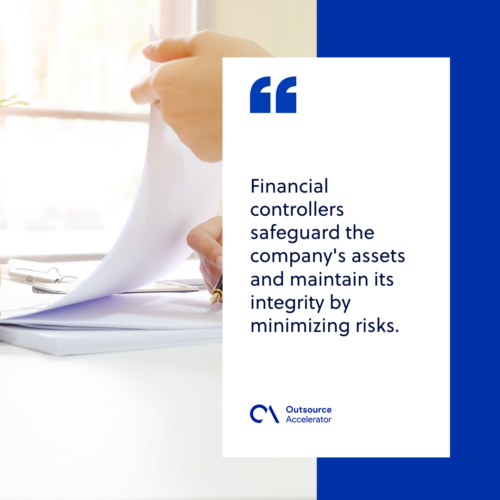5 financial controller duties to enhance your business finances

As a business owner or executive, you manage all aspects of your business, including its finances.
However, not everyone is an expert in financial management. You might experience discrepancies, errors, and delays in updating your financial information, causing penalties and hurting your business in the long run.
Hiring a financial controller can give you more advantages for this part.
In this article, let’s explore the role of financial controllers and the duties they perform to improve your business finances significantly.
What is a financial controller?
A financial controller is a strategic partner acting as an overseer of the financial health of an organization. These professionals analyze data, provide insights, and ensure a company’s financial stability and growth.
In general, a financial controller is responsible for managing all accounting activities, from high-level to simple financial activities.
Financial controllers bridge the gap between day-to-day financial operations and long-term financial strategy.

Financial controller vs. Finance-related positions
The role of a financial controller is unique from other finance-related positions, though each holds similar tasks.
Here are some comparisons between financial and other finance-related positions in an organization:
Financial controller vs. CFO
A financial controller differs from a chief financial officer (CFO) or finance executive positions when it comes to their work level. Financial controllers usually work under a CFO or VP of finance, garnering a mid-management position.
They oversee accounting, financial reporting, and internal controls. Their focus is on ensuring accuracy, compliance, and timely reporting. While they provide crucial financial insights, their role is more tactical and operational.
The CFO concentrates on the organization’s financial strategy. CFOs are forward-thinking decision-makers who analyze financial data to drive growth, optimize capital structure, and shape long-term financial goals.
Unlike the controller, the CFO is more engaged in high-level financial planning and risk management.
Financial controller vs. VP of finance
The financial controller’s role revolves around maintaining financial integrity and overseeing day-to-day financial operations. Financial controllers ensure the accuracy of financial data and compliance with regulations.
The vice president of finance oversees various finance functions and collaborates with other departments. VPs of finance are key in budgeting, forecasting, and financial analysis to support the organization’s growth and profitability.
Unlike the controller, the VP of finance is more involved in financial strategy development.
Financial controller vs. Accountant
At a mid-management level, a financial controller is higher than usual accountants and bookkeepers. This role usually manages these teams as part of their responsibilities.
Financial controllers have a broader scope. As mentioned, they cover various accounting functions, financial reporting, internal controls, and compliance.
Accountants focus primarily on recording financial transactions, preparing financial statements, and ensuring compliance with accounting standards. Their role is more transactional and centered around accurate record-keeping.
Financial controller vs. Bookkeeper
Financial controllers’ role extends beyond bookkeeping. They oversee internal controls and financial reporting. Their responsibilities include analyzing financial data to provide valuable insights.
Bookkeepers manage day-to-day financial transactions, including recording income and expenses, reconciling accounts, and maintaining ledgers. They are more administrative and focused on data entry.
Financial controller vs. Comptroller
Financial controllers and comptrollers hold almost the same duties. However, they can occur in different business settings.
A financial controller is responsible for the company’s financial operations, internal controls, and financial reporting, ensuring accurate and timely financial data for decision-making.
The role of comptrollers are often synonymous with that of a financial controller. Though, they are more focused on overall financial management.
In addition, the term “comptroller” is more commonly used for governmental and non-profit organizations.
5 duties of a financial controller
A financial controller can improve your processes and cash flow by accomplishing the following duties:
1. Assisting in preparing budgets
One of the primary duties of financial controllers is to assist in budget preparation. They create a comprehensive budget that guides financial decisions by analyzing historical data and market trends.
This proactive approach helps allocate resources effectively and identify potential areas for cost savings.
2. Managing internal controls
Internal controls are the safeguards that prevent financial mismanagement and fraud. A financial controller designs, implements, and monitors these controls to ensure accuracy and compliance
Financial controllers safeguard the company’s assets and maintain its integrity by minimizing risks.

3. Approving invoices
Invoices are the lifeblood of a company’s cash flow.
A financial controller reviews and approves invoices, ensuring accurate and timely payments. Maintaining a close eye on accounts payable and receivables contributes to a smooth cash flow cycle and prevents disruptions.
4. Consolidating financial reports
Financial data is scattered across various departments and systems. Part of a financial controller’s responsibilities include consolidating these reports into a coherent and accurate financial picture.
This consolidated view enables informed decision-making and clearly explains an organization’s financial performance.
5. Ensuring compliance
Financial regulations and reporting standards are constantly evolving. A financial controller ensures the company’s compliance with these regulations, reducing the risk of legal issues and financial penalties.
This duty is essential for maintaining the company’s reputation and building stakeholder trust.
Why you should hire a financial controller
All in all, a financial controller has the power to guide your company into financial gains and profitability. Like most finance roles, you can outsource this to experts for better management.
Here are some of the reasons why you should hire a financial controller today:
Strategic financial guidance
A financial controller offers more than just number-crunching; they provide strategic insights based on data analysis. The expertise helps steer the company toward profitable ventures and optimal financial decisions.
Improved resource allocation
A financial controller’s ability to analyze financial data helps identify areas where resources can be maximized, leading to cost savings and increased efficiency.
Risk management
With internal controls and compliance oversight, a financial controller reduces the company’s exposure to financial risks. This safeguards the company’s assets and ensures long-term stability.
Accurate financial reporting
Financial reports are the foundation of business decisions. A financial controller consolidates and verifies these reports to ensure accurate and reliable data.
Enhanced stakeholder confidence
Investors, creditors, and other stakeholders rely on transparent and accurate financial information.
A financial controller’s dedication to compliance and accuracy fosters trust and confidence among stakeholders.







 Independent
Independent




